Creating a Microsoft Word email template streamlines your communication process and ensures your messages look polished and professional. These templates save you time by reducing formatting efforts, giving your emails a cohesive brand identity. Incorporating branded elements like logos enhances visual appeal, while personalized content can boost engagement significantly. Don't forget to include a clear call to action to guide your recipients on next steps. By following best practices and avoiding common mistakes, you'll maximize your email impact. There's plenty more to explore that can elevate your email communication even further, so keep going!
Key Takeaways
- Microsoft Word email templates maintain a consistent format, enhancing professional appearance and brand identity across communications.
- Personalizing templates can significantly increase engagement, with open rates rising by 26% and click-through rates by up to 50%.
- Including a clear and actionable call to action (CTA) can boost interaction rates by 371% and drive sales effectively.
- Utilizing Quick Parts and AutoText in Word streamlines repetitive tasks, saving time and improving email management efficiency.
- Regularly updating and organizing email templates ensures timely communication and enhances overall productivity in outreach efforts.
Introduction

When you need to communicate effectively via email, using Microsoft Word email templates can make all the difference. These templates help you create professional emails with a consistent format and design, ensuring your business communication stands out.
By utilizing these templates, you can easily incorporate essential elements like branding and logos, enhancing the overall professionalism of your messages.
Imagine reducing the time you spend on formatting and designing emails. With Microsoft Word's features, you can streamline your email process, allowing you to focus more on the actual content.
Quick Parts and AutoText are invaluable tools within Word that let you save frequently used phrases for quick insertion into your email templates. This boosts your efficiency, making it easier to maintain high-quality correspondence.
Furthermore, when you create email templates, you ensure that your email correspondence maintains a cohesive look and feel, which is crucial for solidifying brand identity.
Boosts Engagement and Response Rates
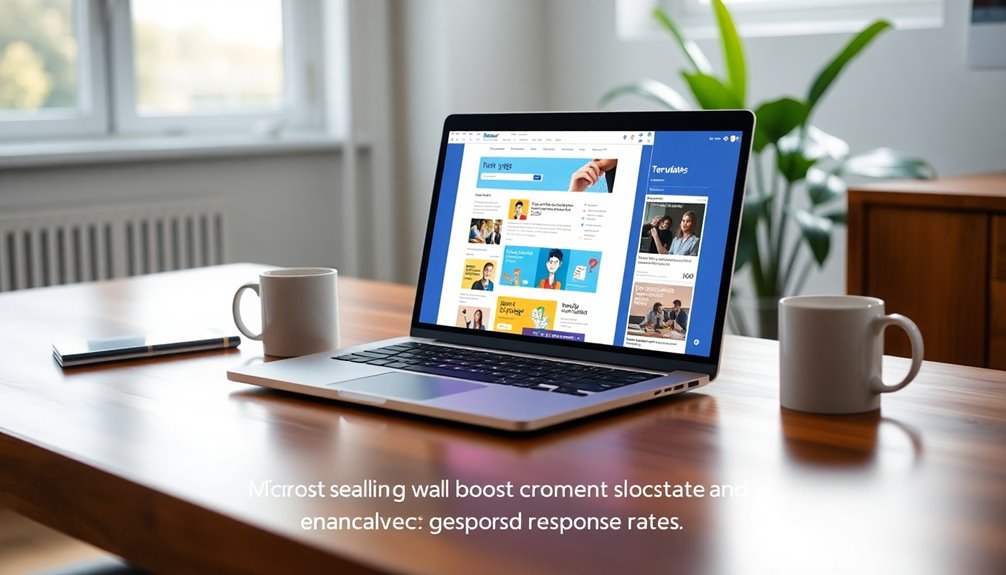
Using Microsoft Word email templates can significantly boost engagement and response rates. With these templates, you can create a new, personalized email that resonates with your audience. Studies show that personalized email templates can result in a 26% increase in open rates, helping you foster stronger connections with your recipients.
Moreover, emails crafted with Microsoft Word aren't only visually appealing but also well-structured. This can enhance your professional image and lead to a click-through rate boost of up to 50%. By incorporating relevant details such as recipient names and specific data, you enhance the email's relevance, which translates to higher response rates.
Streamlined communication is another advantage of using standardized email templates. You save an average of 30 minutes per email, allowing for more timely interactions with clients and stakeholders.
This efficiency means you can focus on crafting effective emails that convey your message clearly and professionally. Overall, utilizing Microsoft Word email templates is a powerful strategy to engage your audience, improve response rates, and maintain a consistent brand image.
Clear Call to Action

To maximize the effectiveness of your emails, incorporating a clear call to action (CTA) is vital. A well-defined CTA guides your recipients on the next steps, significantly increasing engagement and response rates.
Whether you're using a template or crafting a professional email from scratch, make sure to create personalized CTAs that resonate with your audience.
Effective CTAs should be specific, actionable, and concise. Use imperative verbs like "Sign Up Now" or "Get Your Free Trial" to prompt immediate responses. Additionally, consider the impact of credit card debt on your audience when creating financial-related CTAs.
Position your CTA prominently within the email—consider placing it in the subject line, opening paragraph, or as a button. This visibility encourages interaction and drives desired actions.
Furthermore, testing different CTAs through A/B testing can help you discover the most effective phrasing and placement. This practice can lead to substantial improvements in your email communication.
Research shows that including a clear call to action can boost click-through rates by up to 371% and increase sales conversions by an impressive 1617%. Additionally, using predictive analytics in your email strategy can further enhance audience targeting and engagement.
Step-by-Step Guide to Writing Follow-ups
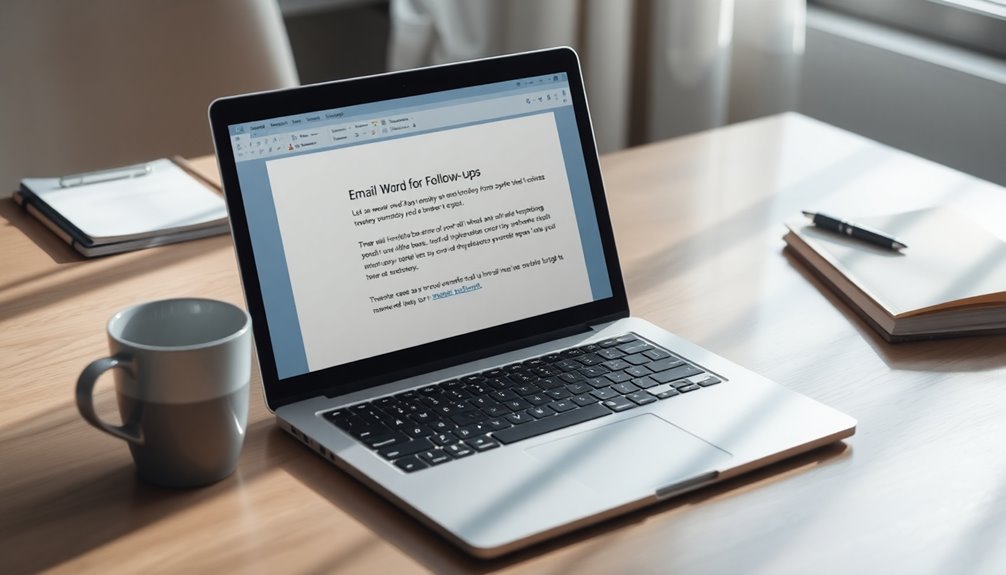
How can you ensure your follow-up emails stand out and prompt a response? Start by sending your follow-up emails within 24 to 48 hours after your initial contact. This timing keeps the conversation fresh and demonstrates your promptness.
To create an email template that resonates, personalize your message with specific details from prior discussions. This simple act can boost your response rates by up to 50%.
Next, craft a clear subject line that reflects the email's purpose, like "Following Up on Our Meeting." This improves the chances of your email being opened and read.
In your email creation, maintain a professional layout to enhance readability.
Don't forget to include a call-to-action (CTA) within your follow-up. This encourages the recipient to respond or take the desired action, enhancing the email's effectiveness.
If you've set up an Outlook email template, you'll save time and ensure consistency, making quick adjustments as needed based on the conversation context.
Pro Tips for Maximizing Impact
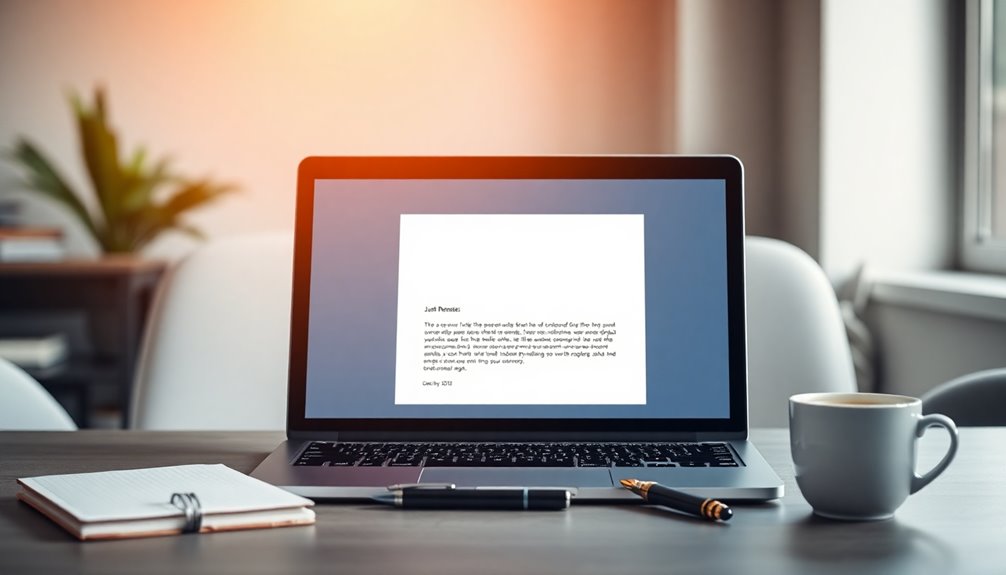
Maximizing the impact of your follow-up emails hinges on a blend of strategic design and thoughtful content. Start by utilizing Microsoft Word to create email templates in Outlook that ensure consistent formatting and enhance your brand image.
When you're creating a template, incorporate essential elements like your logo, contact information, and a clear call to action.
Take advantage of Quick Parts and AutoText features in Word to save frequently used phrases. This allows for quick insertion and reduces repetitive typing, streamlining your communication process.
Additionally, leverage the mail merge functionality for personalized mass emails. Tailoring messages to individual recipients can significantly boost engagement rates.
Don't forget about visual appeal! Incorporate custom themes and layouts into your templates in Microsoft to capture attention and improve readability.
Regularly test and optimize your email templates based on recipient feedback and performance metrics. By doing so, you'll enhance overall communication impact and ensure your messages resonate with your audience.
Common Mistakes to Avoid
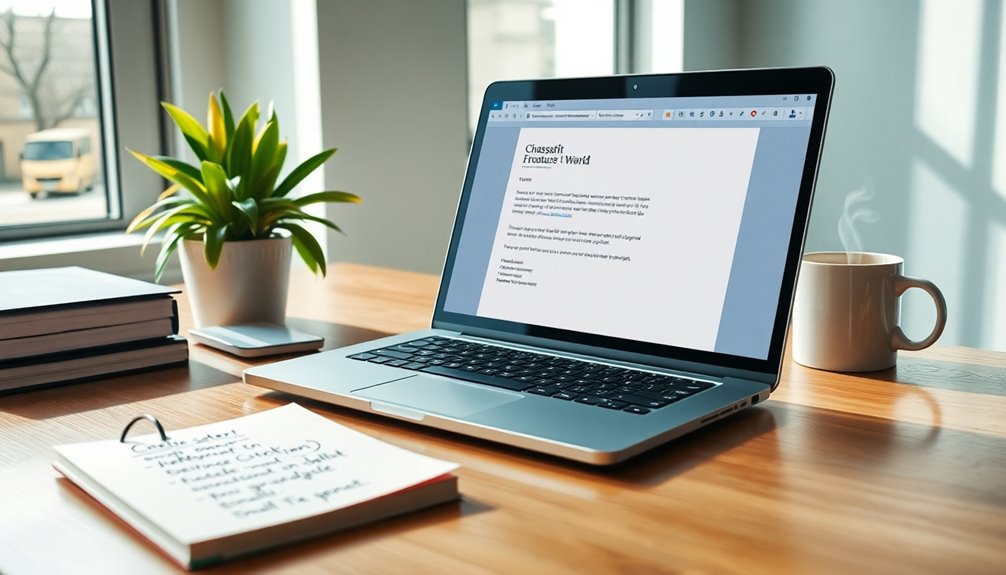
Crafting effective email templates requires attention to detail, as overlooking common mistakes can undermine your efforts. One major pitfall is neglecting a clear subject line. Remember, 33% of recipients decide whether to open an email based solely on that line. Make sure it's compelling!
Another mistake is failing to personalize emails. When you create personalized emails, you engage your audience more effectively; they can deliver six times higher transaction rates than generic messages. Additionally, diversifying investments in your marketing strategy can help reach a broader audience.
Always proofread your templates. Spelling and grammar errors can damage your professionalism, with 59% of consumers avoiding companies with frequent typos.
Avoid using overly complex language or jargon. Stick to straightforward communication, as 72% of professionals prefer simple language in business emails.
Lastly, include a clear call to action (CTA). Emails with a single CTA can increase clicks by 371% and boost sales by 1617%. Moreover, regularly cleaning your email list can significantly enhance email deliverability and engagement, ensuring your messages reach the intended audience effectively.
Sales Follow-up Template Example
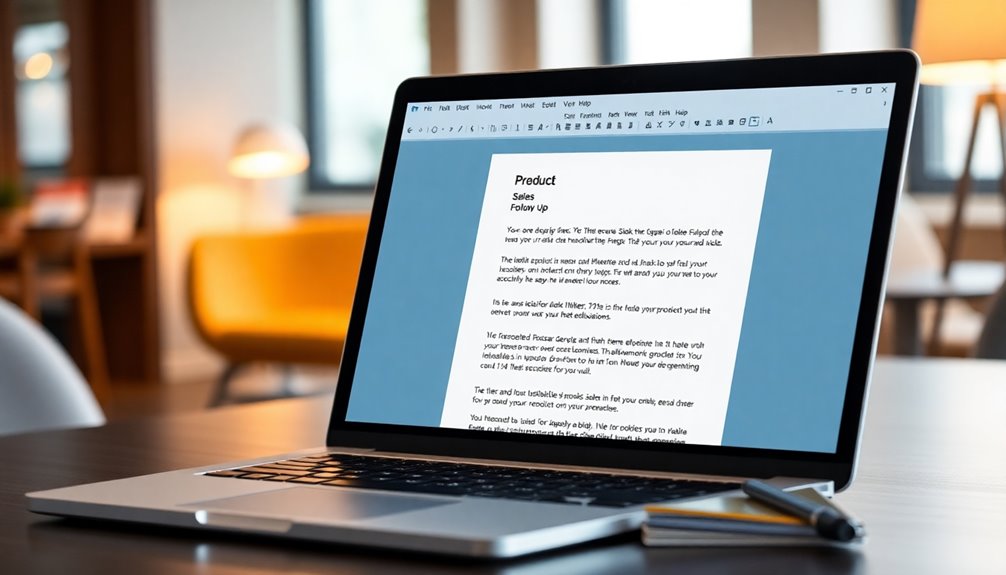
A well-structured sales follow-up email can significantly enhance your chances of closing a deal. Start with a clear subject line that references your previous interaction, grabbing the recipient's attention right away.
Personalization is key, so make sure to include their name and specific details from your earlier discussion. This shows you value their time and are genuinely interested.
In the body of your email messages, include a brief recap of the product or service you discussed, highlighting its compelling benefits. Reinforcing the value proposition can spark further interest and engagement. Additionally, high-quality content that addresses the recipient's needs can further strengthen your case and improve engagement.
Don't forget to utilize a professional layout by using Microsoft Word templates to create visually appealing email messages that enhance the overall impression of your communication. Additionally, following a structured approach in your emails can lead to increased energy levels and motivation, similar to the benefits observed in low carb diets.
Final Thoughts
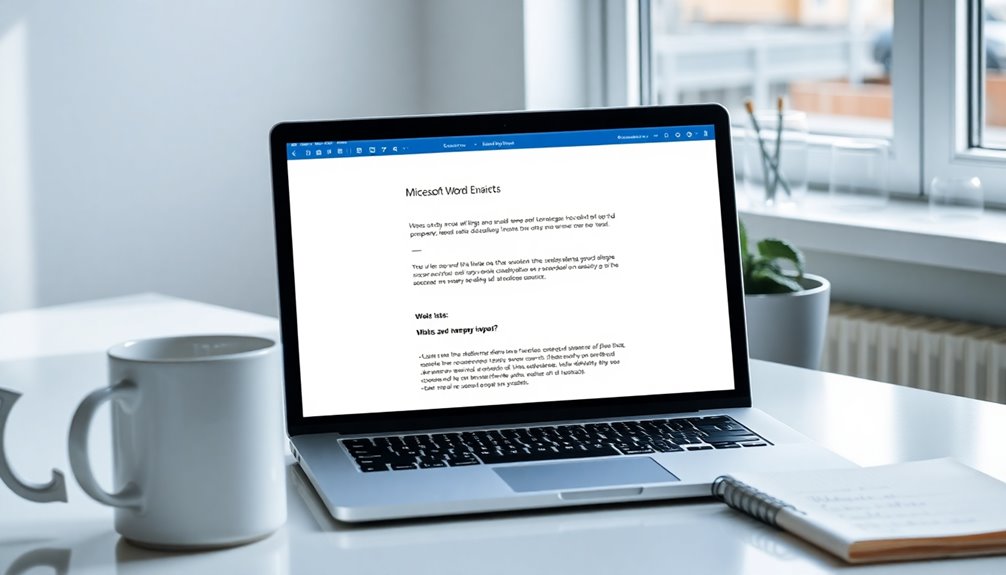
Often, the right tools can make all the difference in your email communication. Using a template in Microsoft Word not only streamlines your process but also ensures your emails look polished and professional. By saving your documents with the "Save as type" option, you can create easily accessible templates that enhance your workflow.
When you simply type in your custom messages, you maintain formatting consistency across various email clients, which is crucial for a lasting impression. Additionally, incorporating elements like logos and color schemes reinforces your brand identity.
Consider utilizing AutoText entry for frequently used phrases or special offers, making it easier to personalize your communications. This personalization can help foster stronger relationships with your recipients.
Moreover, regularly updating and organizing your templates can lead to a noticeable increase in engagement rates—up to 20%—making them an invaluable asset for your email marketing strategies.
Frequently Asked Questions
How Do I Turn a Word Document Into an Email Template?
To turn a Word document into an email template, design your document, save it as a Word template, then copy and paste the content into a new email for easy customization and consistent branding.
How Do I Create a Professional Email Layout?
To create a professional email layout, use consistent fonts and colors, include a clear subject line, and add a professional greeting and signature. Incorporate bullet points for readability, and ensure it's mobile-responsive for all devices. To keep your message concise and engaging, focus on the main points and avoid unnecessary jargon. Proofread carefully to eliminate typos or awkward phrasing that could detract from your professionalism. For structured outreach, consider using a collaboration pitch email template to streamline your communication and make a strong impression.
How Do I Create an Email Template in Microsoft Mail?
To create an email template in Microsoft Mail, compose a new email, add your content, then save it as an Outlook Template. You can easily access and edit it later for specific recipients.
Does Microsoft Office Have an Email Program?
Yes, Microsoft Office includes Outlook, a robust email program. You can send, receive, and manage emails efficiently. With features like calendar integration and task management, you'll enhance your productivity significantly while using the software.









